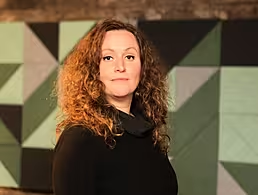Nadia Neytcheva discusses the crucial role telehealth technologies have in creating a fair and accessible healthcare system.
Born in Bulgaria, a country where STEM studies are central to the education system and raised in Italy, where she had the opportunity to explore humanities and classics, Nadia Neytcheva’s education has been defined by multiculturalism.
“My multicultural background has been a strong influence throughout my life and inspired my passion for breaking down barriers, both geographical and cultural, and ultimately drew me to the STEM field, where I saw an opportunity to drive meaningful change,” she told SiliconRepublic.com.
She holds an MSc in economics and management of innovation and technology from Bocconi University, which sparked an interest in digital innovation and its potential to transform industries. However, it was an early role as COO at BTO Research that allowed her to work on projects where she began to understand the real potential technologies have in solving life’s complex challenges.
Now the CEO and co-founder of global telehealth platform Doctorsa, she has found that while the path towards finding a career with meaning and impact has not always been obvious, the ability to change people’s circumstances and impact how we live, has always been a key motivator.
“Throughout this journey, what has driven me most is the opportunity to make healthcare more accessible, affordable and patient-focused. My road to success hasn’t been linear, but the challenges along the way have served to reinforce my belief in the power of technology to break down barriers and improve lives.”
Transforming the landscape
According to Neytcheva, technology has the potential to completely and fundamentally reshape the healthcare landscape, to create an environment that is more efficient and inclusive. Telehealth technologies in particular can connect vulnerable people with professionals, removing the barriers thrown up by geographical borders.
“This has been transformative for individuals in underserved regions or those unable to access traditional healthcare services due to distance or long wait times. Advancements in health-tech have also improved healthcare delivery by addressing inefficiencies.
“Digital platforms enable greater transparency and personalisation. This shift not only benefits patients but also creates a competitive, value-driven healthcare model that puts their needs first.”
She explained that technology can help alleviate the pressures placed on overburdened and under-resourced traditional healthcare systems, as non-urgent cases can be rerouted through digital platforms, reducing overcrowding in emergency rooms and clinics.
“Technology has redefined healthcare as a borderless and inclusive service, creating a world where access to quality care is determined by need, not location or circumstance. The result is a more resilient, equitable healthcare system that continues to evolve with innovation.”
Transforming the challenges
For Neytcheva, it is incredibly exciting to be at the forefront of technology and the healthcare world, wherein she can make a tangible difference in people’s lives, through innovation. But despite the massive progress being made in the area of telehealth, the sector, she explained, is not without its challenges.
“Balancing rapid growth while maintaining our core values and company culture requires concerted effort. We’re a women-led team of eight and fostering collaboration, trust and alignment across time zones has been both a challenge and a strength. It’s taught me the importance of adaptability, clear communication and empowering each team member to take ownership of their role.”
Additionally, a lean budget has resulted in the need to become resilient and to figure out simple yet effective ways to stretch every resource to the brink, maximising potential and ensuring a consistent standard. “This has pushed us to constantly innovate, simplify and stay laser-focused on our mission.
“In each country we’ve entered, a few recurring issues emerge. At their core, they can be simplified into two main challenges”, Neytcheva explained. These are a shortage of doctors and healthcare providers to manage essential services and a misalignment of values between physicians and other healthcare professionals, with the system often relying on mission-driven values and personal sacrifices to keep it afloat.
“These are complex issues without an obvious solution. However, one approach could be to borrow from the start-up world, which is to focus on your ‘white-hot centre’, the core of your value generation. This means doubling down on what you do best, letting go of areas where others can step in more effectively and leaving some gaps for others to fill.
Coming from a background outside healthcare, Neytcheva is of the opinion that by applying concepts from alternative fields, such as digital services, consumer-facing departments and even hospitality, there is massive potential to improve how we care for people when they are vulnerable.
Telehealth could be an invaluable tool in addressing disparities in access to healthcare and in making quality care a reality for people around the globe. “Healthcare is complex and delicate, so it might be harder to achieve the same level of customer focus, but knowing we need to try harder can make a difference.”
Don’t miss out on the knowledge you need to succeed. Sign up for the Daily Brief, Silicon Republic’s digest of need-to-know sci-tech news.




